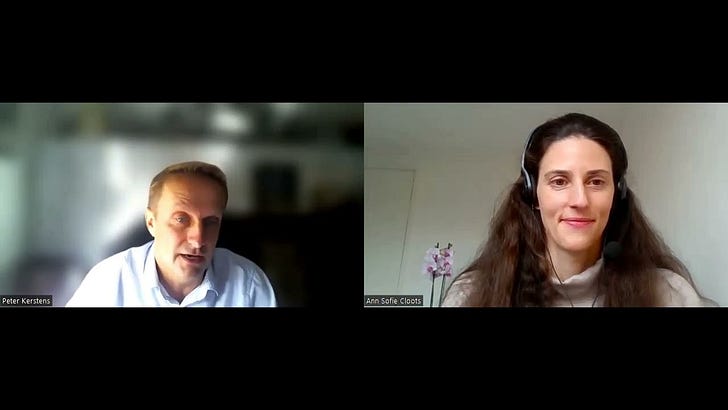MiCA's impact on DAI, stablecoins & DeFi + bi-weekly update
Hello everyone,
You may have noticed that I have not sent out weekly newsletters for a few weeks now. Although it is fun and interesting to write them, it also takes a great deal of time. That’s why I decided to change the format. Together with the great team at Oasis we will publish a bi-weekly legal update. (See below.)
In addition, I will give you key highlights from CryptoLaw’s interviews - this week with Peter Kerstens, European Commission Advisor, who shared his personal insights on the EU’s much-discussed Markets in Crypto Assets (MiCA) Regulation.
Peter Kerstens shared his (personal) insights on MiCA, DeFi, stablecoins & more. Key takeaways👇
📍The “majority of crypto assets on the market and certainly the largest crypto assets … do not qualify under European definitions of either funds or financial instruments or banking products”.
📍Key concerns of financial regulators: market integrity, conflicts of interest, market manipulation. "We see a fair degree of market manipulation or unexplainable market movements in crypto markets. And these are the areas that most concern policymakers and financial regulators and that we sought to address in the MiCA Regulation.”
📍Future of #stablecoins in MiCA: “MiCA does cover algorithmic stablecoins but in a way which basically prohibits algorithmic stablecoins.”
Would popular algo stablecoin DAI be unlawful in EU under MiCA? “DAI would either have to fully collateralize, and then they become an EMT ... or drop their stability claim." (not legal advice! personal opinion)
📍Enforcement: that's another question. It is not clear if and how some of the rules can be enforced, especially against non-EU-based entities and for activities without an intermediary.
📍#DeFi: actual DeFi not covered by MiCA but many DINOs (decentralized in name only). Bitcoin issuance “not regulated by MiCA because there is no issuer.” “If there is no service provider, then it is not covered by MiCA. Say, if someone drafts a smart contract or an application that allows you to engage with a smart contract or with a crypto asset protocol, is that a crypto asset service? Under MICA, it isn’t.” But debate about need for MiCA 2.0 to cover DeFi.
📍Could #DAOs be considered intermediaries? "Maybe we will come to a new definition, a new paradigm” as to DAOs and entities. Some DAOs may resemble entities more closely, while others look more like movements.
📍Why model MiCA on financial regulation? "Investor protection rules are often about addressing information asymmetry, conflicts of interests or prohibiting the combination of certain activities within certain entities. That really is what financial market regulation is about."
(Disclaimer: personal opinions only. Not legal advice.)
Bi-weekly legal update
• The US judge in the Ooki DAO trial ordered the CFTC to serve notice of its lawsuit on the original founders of bZeroX, Tom Bean and Kyle Kistner, both residing in the US and Ooki DAO token holders. The CFTC had argued that it served a lawsuit on the entire DAO by posting it on an online forum and chat box. However, the judge ruled that “to provide the best practicable notice, the CFTC should serve at least one identifiable Token Holder”. Since both Bean and Kistner are US residents and token holders, the judge ordered the CFTC to serve notice to them. An attorney for the duo wrote the two “no longer have any involvement with the governance of the Ooki DAO. Accordingly, Bean and Kistner are not authorized to accept service on behalf of 'the Ooki DAO' ‐‐nor could they be."
• Eva Kaili, Vice President of the European Parliament and one of the most pro-crypto MEPs, was arrested in a bribery investigation. Prior to her arrest, Kaili had been gathering input on a regulatory approach to NFTs, which are not covered from the EU’s MiCA Regulation.
• Sam Bankman-Fried was denied bail by a Bahamian Court, where he was arrested on the instruction of the US. The US SEC, CFTC and the Southern District of New York each have brought charges against SBF. Meanwhile, the Securities Commission of the Bahamas accused new FTX CEO John Ray of misstating its relationship with SBF in order to “make headlines and advance questionable agendas.”
• Authorities in China arrested 63 individuals accused of laundering 1.7bn USD using tether. Operating since 2021, Chinese authorities said the group sourced funds from illegal pyramid schemes, fraud and gambling, and recruited people around the world to help launder funds with USDC.
• Crypto exchanges in Canada are required to segregate user funds from operational cash and stop offering leverage to margin traders, according to new guidelines by the Canadian Securities Administrators. The CSA “Crypto trading platforms are expected to have established policies and procedures to determine whether each crypto asset they provide exposure to is a security and/or derivative.
• The US FinCEN is looking into DeFi’s impact on traditional financial intermediaries that “play a critical role” in its AML/CFT efforts. Tasked with “combating money laundering” FinCEN will be analysing whether further regulations will be introduced, in light of the executive order on digital assets that was signed by US President Joe Biden in March.
• Australia will introduce new rules for the licensing and regulation of crypto service providers firms in 2023. The Government will also update the Payment Systems Regulation Act 1998 to establish the Reserve Bank of Australia’s ability to regulate new payments systems, such as digital wallet providers. The chosen approach centres around exercising “token mapping” market research that will assist authorities in evaluating which assets and services should be regulated. A consultation paper determining the regulations is expected to be released in early 2023.
• The European Securities and Markets Authority (ESMA) published guidance for applicants of the DLT Pilot regime.
Thanks for reading!


